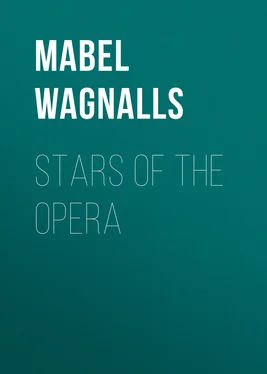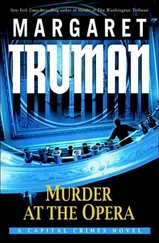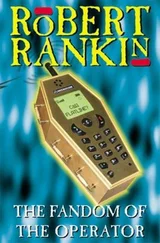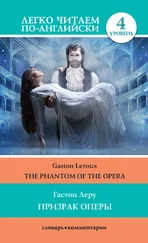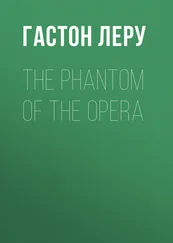Mabel Wagnalls - Stars of the Opera
Здесь есть возможность читать онлайн «Mabel Wagnalls - Stars of the Opera» — ознакомительный отрывок электронной книги совершенно бесплатно, а после прочтения отрывка купить полную версию. В некоторых случаях можно слушать аудио, скачать через торрент в формате fb2 и присутствует краткое содержание. Жанр: foreign_antique, foreign_home, music_dancing, на английском языке. Описание произведения, (предисловие) а так же отзывы посетителей доступны на портале библиотеки ЛибКат.
- Название:Stars of the Opera
- Автор:
- Жанр:
- Год:неизвестен
- ISBN:нет данных
- Рейтинг книги:5 / 5. Голосов: 1
-
Избранное:Добавить в избранное
- Отзывы:
-
Ваша оценка:
- 100
- 1
- 2
- 3
- 4
- 5
Stars of the Opera: краткое содержание, описание и аннотация
Предлагаем к чтению аннотацию, описание, краткое содержание или предисловие (зависит от того, что написал сам автор книги «Stars of the Opera»). Если вы не нашли необходимую информацию о книге — напишите в комментариях, мы постараемся отыскать её.
Stars of the Opera — читать онлайн ознакомительный отрывок
Ниже представлен текст книги, разбитый по страницам. Система сохранения места последней прочитанной страницы, позволяет с удобством читать онлайн бесплатно книгу «Stars of the Opera», без необходимости каждый раз заново искать на чём Вы остановились. Поставьте закладку, и сможете в любой момент перейти на страницу, на которой закончили чтение.
Интервал:
Закладка:
She is embraced by the children, who love Charlotte dearly, for she is to them both a sister and a mother. Regardless of her best gown, she now goes to a buffet on the veranda and distributes slices of bread and butter. This scene has prompted the epithet, "bread-and-butter opera."
In the mean time Werther is welcomed by the bailiff and introduced to Charlotte. Sounds of gay music accompany the arrival of guests who will take Charlotte to the ball. This festive music is unique. The bass presents a defiant repetition of one chord that is stubbornly out of harmony with the bright melody above, like old age shaking his head at youthful gaiety.
It is decided that Werther shall go along to the ball. The dance-theme is resumed, and the merry party go out. Sophia takes the children into the house, and the bailiff goes off to the tavern, humming on the way that comical drinking-song.
The stage grows darker, the music softer, and we hear a fragment of the Albert-theme. It is like seeing the shadow before the person, for Albert soon enters. He has returned unexpectedly. Sophia rushes out to greet him, and she regrets that Charlotte is absent.
Before going into the house Albert sings to the night winds of his love, and hopes that Charlotte on entering the garden will discover the thoughts that he leaves.
The orchestra toys with this melody for a time, but then is diverted by memories of the ball music. Snatches of the bewitching strain flit by in different keys, like belated guests in vari-colored dominoes. They are faint as phantoms—a gentle swaying of the violins, a touch of the harp, and then they vanish. There is a pause. The moon has appeared, and the humble garden seems transformed into a fairy bower.
Like the spirit of a dream is the melody now arising. Ethereal in its beauty but supreme in power, it rules over the entire opera. This is the love-theme. We are not surprised to see Werther and Charlotte enter arm in arm. It is a familiar situation: he is "seeing her home" from the ball. And arrived at their destination, they linger at the gate as couples have done before and since.
Charlotte is of a serious nature, and their talk is never light. She tells of her mother and the terrible experience of losing one so dear. "I believe that she watches over me and knows when I do her bidding." Charlotte's tones are full of pathos, and she becomes abstracted in her memories, while Werther, enraptured by her goodness and beauty, gives utterance to the feelings that enthrall him. The music grows stronger and higher, until it breaks forth in a resounding reality of the love-theme. Over an accompaniment of throbbing chords this superb melody sweeps by like a meteor passing the earth; and during this luminous transition we hear the voice of Werther, "Charlotte, I love thee!" There follows a hush, and then a chilling, awful discord. Some one is calling from the house, "Albert has come home!" Charlotte staggers at this news. She explains that Albert is her betrothed—it was her mother's wish. "May she forgive me, that for one moment at your side I forgot my vow." Charlotte goes up the steps; she turns once, but then hastens inside. Werther buries his face in anguish at the thought of her wedding another.
Several months have elapsed since the events of the first act. The elm-tree foliage is denser and the situations of the drama have changed, but love and music remain the same.
Schmidt and Johann are discovered sitting before the tavern "of a Sunday afternoon." Their good-natured song of Bacchus greets us like an old friend. The church and parsonage are in plain view, and a solemn choral from within alternates with the drinking-song without. The village is to-day en fête in honor of the pastor's golden wedding.
The serious and thoughtful Albert-theme marks the entrance of Charlotte and Albert, who are married. They loiter on their way to church and sit down on a bench under the trees. Very calm and tender is the music of this little scene between husband and wife. The organ resounds the chords of a beautiful hymn, at which summons Charlotte and Albert join the other worshipers.
Werther has been observing the pair from a distance. When they are gone he comes forward, exclaiming with grief and bitterness, "Wedded to another!" The tempestuous chords of the orchestra clash into the holy harmonies of the organ. Jagged fragments of Werther's first song of admiration depict his shattered joy. As one holds together the pieces of a broken vase, sadly recalling its lost loveliness, so does the orchestra again build up that old theme in all its beauty while Werther sings of what might have been. Rebellious at fate, he cries out: "It is I—I alone whom she could have loved!" The succeeding aria is reckless as a steed galloping to his death. It plunges from high tones to a sob, and the singer, flinging himself upon a bench, buries his face in his arms.
Albert discovers Werther thus despondent, and, suspecting the cause, he questions him; but Werther desperately disclaims his love for Charlotte. This interview is musically serious and sad. But suddenly the orchestra gives us a new key, a new melody, a sprinkling of lithesome staccatos falling like a shower of apple-blossoms. With a smile on her lips and flowers in her hands, Sophia enters, unconscious of the surrounding turbulent emotions. She gaily announces that they intend to dance, and that Werther must join her in the minuet. Observing his somber expression, she bids him cheer up, for to-day—
"All the world is gay!
Joy is in the air!"
This song is the most popular one of the opera. It is bright and light, and full of fluttering phrases—a veritable song of spring.
When Albert and Sophia are gone, Werther cries out with explosive candor, "I told a falsehood!" He is wretched beyond compare. He can not cease loving, and he dare not cease lying.
Charlotte comes from the church, and, greeting him kindly, asks if he, too, is going to the parsonage. They speak lightly but feel deeply, as is evidenced by the music. That wondrous love-theme softly surrounds them like the magic fire of the Walküre. The harmonies mount up from the instruments like flames from living embers. A spell is upon them. Charlotte stands mute, while Werther sings of that evening when he touched her hand and looked into her eyes for the first time. Softly and slowly the beautiful melody disappears, giving place to a different chord and motif: "Albert loves me—and I am his wife!" Charlotte has recovered herself. She entreats Werther to turn his heart elsewhere: "Why do you love me?" This hero seems to understand himself, for he answers: "Ask a madman why he has lost his reason!" Then Charlotte urges him to go away for a time, say until Christmas. "Yes, until Christmas—good-by, my friend!" She leaves before he has time to refuse.
Now follows a musical adaptation of Goethe's very poetical and ingenious plea for suicide.
"Do we offend Heaven in ceasing to suffer? When a son returns from his journey before the expected time, far from feeling resentment, the father hastens to greet him; and can it be that our heavenly Father is less clement?"
During this soliloquy we encounter strange chords in the orchestra. Strains of a gay minuet play upon these tragic tones like rainbow colors on the angles of a glacier.
The dance has begun, and Sophia, appearing at the parsonage door, tells Werther that she is waiting. He walks away.
"You are leaving! But you will come back?" cries the disappointed Sophia.
"No—never! Good-by!" and Werther turns down the road out of sight. Either for the lost dance or the lost partner, Sophia bursts into tears. Albert and Charlotte find her thus, and between sobs she tells them how Monsieur Werther has gone away forever. Charlotte stands rigid, while Albert exclaims to himself: "He loves my wife!" The gay assemblage within the parsonage has no knowledge of this brewing tragedy, so the minuet continues till the curtain descends.
Читать дальшеИнтервал:
Закладка:
Похожие книги на «Stars of the Opera»
Представляем Вашему вниманию похожие книги на «Stars of the Opera» списком для выбора. Мы отобрали схожую по названию и смыслу литературу в надежде предоставить читателям больше вариантов отыскать новые, интересные, ещё непрочитанные произведения.
Обсуждение, отзывы о книге «Stars of the Opera» и просто собственные мнения читателей. Оставьте ваши комментарии, напишите, что Вы думаете о произведении, его смысле или главных героях. Укажите что конкретно понравилось, а что нет, и почему Вы так считаете.
